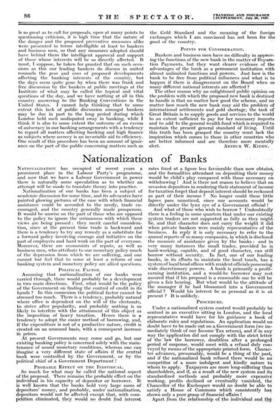PROBABLE EFFECT ON THE INDIVIDUAL.
So much for what may be called the national aspect of the proposal. There remains the probable effect on the individual in his capacity of- depositor or borrower. It is well known that the banks hold very large sums of depositors' money, and probably, under nationalization, depositors would not be affected except that, with com- Petition eliminated,- they would no doubt find interest rates fixed at a figure less favourable than- now obtains, and the formalities attendant on depositing their money would be child's play compared with those necessary on withdrawing ! And is there not reason to believe that on occasion depositors in rendering their statement of income for taxation forget that deposit interest should be reckoned as part of their income ? No longer could these little lapses pass unnoticed, since our - accounts would be directly under the lynx eye of a Government official !
And what of those who wish to borrow ? Undoubtedly there is a feeling in some quarters that under our existing system traders are not supported as fully as they might be, and that character does not carry the weight it dfd when private bankers were mainly representative of the business. In reply it is only necessary to refer to the annual reports oT so many companies, in which is disclosed the measure of assistance given by the banks : and in very many instances the small trader, provided' he is hard-working, capable, and of good character, can still borrow without security. In fact, one of our leading' banks, in its efforts to maintain the local touch, has a system of local head offices with resident officials possessing wide discretionary powers. A bank is primarily a profit- earning institution, and a would-be borrower may rest assured that if his proposal is a reasonable one he will be given a fair hearing. But what would be the attitude of the manager if he had blossomed into a Government official ? Would his interest be as personal as it is at present ? It is unlikely.
















































 Previous page
Previous page